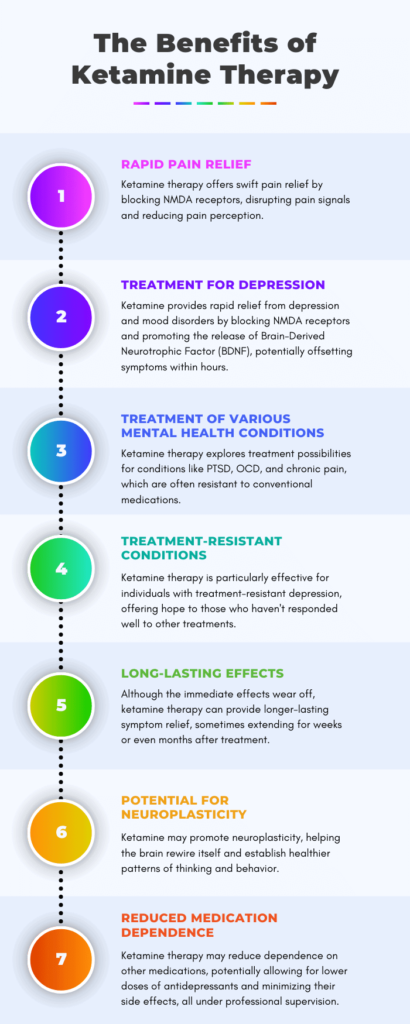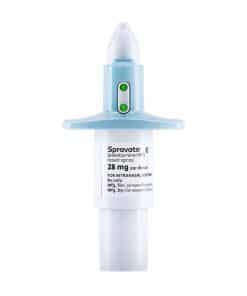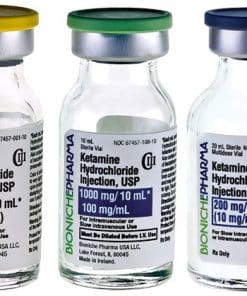Here are 10 Facts related to ketamine:
1. What is ketamine?: Ketamine is a medication primarily used for starting and maintaining
anesthesia. It induces a trance-like state while providing pain relief, sedation, and memory loss.
2. How does ketamine work?: Ketamine works primarily by blocking NMDA receptors in the brain, leading to dissociation and anesthesia. It also affects other neurotransmitter systems, including opioid and monoaminergic systems.
3. What are the side effects of ketamine?: Common side effects of ketamine include nausea, vomiting, dizziness, confusion, and hallucinations. It can also cause changes in blood pressure and heart rate.
4. Is ketamine addictive?: Ketamine has the potential for addiction and dependence, particularly with frequent or high-dose use. It is classified as a Schedule III controlled substance in the United States.
5. What are the uses of ketamine?: Ketamine is used for anesthesia, pain management, depression treatment, PTSD, substance use disorders, and palliative care, among other purposes.
6. How is ketamine administered?: Ketamine can be administered intravenously (IV), intramuscularly (IM), orally, intranasally, or sublingually, depending on the indication and setting.
7. What is ketamine infusion therapy?: Ketamine infusion therapy involves administering ketamine intravenously at a controlled rate over a specified period. It is used primarily for treating depression and chronic pain.
8. How long does ketamine stay in your system?: The duration of ketamine’s effects varies depending on the dose, route of administration, and individual factors. Ketamine typically has a half-life of 2-4 hours but can be detectable in urine for up to several days.
9. What are the risks of ketamine abuse?: Ketamine abuse can lead to tolerance, dependence, cognitive impairments, bladder and kidney problems, and psychological issues such as psychosis and hallucinations.
10. Is ketamine safe for use in children?: Ketamine is considered safe for pediatric use in certain medical settings, such as anesthesia and procedural sedation when administered by trained healthcare professionals. However, its use in children for off-label indications such as depression is still being studied.
These snippets provide concise information on various aspects of ketamine, covering its pharmacology, uses, administration, and potential risks.
K2 and ketamine are two different substances.
1. K2: K2, also known as synthetic cannabinoids or synthetic marijuana, refers to a group of human-made chemicals that are sprayed onto dried, shredded plant material. These chemicals are designed to mimic the effects of THC, the active ingredient in marijuana, but they can be much more potent and unpredictable.
K2 products are often sold under various brand names and marketed as “herbal incense” or “potpourri.” However, they can have severe and potentially life-threatening effects, including hallucinations, paranoia, rapid heart rate, and seizures. K2 is illegal in many places due to its dangers and lack of regulation.
2. Ketamine: Ketamine, on the other hand, is a medication primarily used for anesthesia and pain management. It is a dissociative anesthetic, meaning it induces a trance-like state characterized by sedation, pain relief, and memory loss.
Ketamine works primarily by blocking NMDA receptors in the brain, but it also affects other neurotransmitter systems. While ketamine has legitimate medical uses, it can also be misused as a recreational drug due to its hallucinogenic effects. However, ketamine is a controlled substance and should only be used under the supervision of a qualified healthcare professional.
In summary, K2 and ketamine are distinct substances with different properties, uses, and legal statuses. K2 refers to synthetic cannabinoids that mimic the effects of marijuana but can be dangerous and unpredictable, while ketamine is a medication used for anesthesia and pain management with legitimate medical uses but potential for misuse.
IV ketamine therapy, also known as intravenous ketamine infusion therapy, is a specialized treatment approach that involves administering ketamine intravenously under medical supervision. This therapy has gained attention for its potential effectiveness in treating various mental health conditions, particularly treatment-resistant depression, as well as chronic pain syndromes.
How IV Ketamine Therapy Works
During IV ketamine therapy, a solution of ketamine is administered directly into the bloodstream through a vein. The infusion is typically delivered over a predetermined period, often ranging from 40 minutes to several hours, depending on the protocol and the patient’s response.
Indications for IV Ketamine Therapy
IV ketamine therapy may be used to treat a range of conditions, including:
Treatment-Resistant Depression:
IV ketamine has shown promise in rapidly alleviating symptoms of depression, particularly in individuals who have not responded to traditional antidepressant medications.
Anxiety Disorders:
Some research suggests that IV ketamine may be effective in reducing symptoms of various anxiety disorders, including generalized anxiety disorder (GAD), social anxiety disorder, and post-traumatic stress disorder (PTSD).
Chronic Pain Syndromes:
IV ketamine can be beneficial for managing chronic pain conditions, such as neuropathic pain, fibromyalgia, complex regional pain syndrome (CRPS), and migraines.
Benefits of IV Ketamine Therapy
Rapid Onset of Action:
IV ketamine therapy often produces rapid and significant improvements in symptoms, with some patients reporting relief within hours or days of treatment.
Efficacy in Treatment-Resistant Cases:
IV ketamine is effective in individuals who have not responded to other treatments or who experience severe and debilitating symptoms.
Potential for Long-Term Relief:
Some patients experience sustained improvements in symptoms beyond the duration of treatment sessions, providing long-term relief from depression, anxiety, and pain.
Lower Risk of Respiratory Depression:
Unlike opioids, ketamine has a minimal impact on respiratory function, reducing the risk of respiratory depression and overdose.
Considerations for IV Ketamine Therapy:
Side Effects:
Common side effects of IV ketamine therapy may include dissociation, dizziness, nausea, increased blood pressure and heart rate, and temporary changes in perception.
Monitoring and Safety Measures:
Close monitoring of vital signs and psychological status is essential during IV ketamine infusion to ensure patient safety and minimize the risk of adverse reactions.
Patient Selection:
IV ketamine therapy is typically reserved for individuals who have not responded to other treatments or who require rapid relief from severe symptoms. It is important to undergo a comprehensive evaluation by a qualified healthcare provider to determine if IV ketamine therapy is appropriate for you.
IV ketamine therapy offers a promising and innovative treatment option for individuals struggling with treatment-resistant depression, anxiety disorders, and chronic pain syndromes.
While further research is needed to fully understand its mechanisms of action and long-term effects, IV ketamine therapy provides new hope for those who have not found relief with traditional treatments.
Ketamine Therapy Works
Ketamine therapy, also known as ketamine-assisted therapy or ketamine treatment, involves the therapeutic use of ketamine, a dissociative anesthetic, for various mental health and pain management conditions. This innovative approach to treatment has gained attention for its potential to rapidly alleviate symptoms in individuals who have not responded to traditional therapies.
How Ketamine Therapy Works
Ketamine therapy typically involves the administration of ketamine in a controlled setting, such as a clinic or medical office, under the supervision of a trained healthcare provider. Ketamine can be administered via intravenous infusion, intramuscular injection, nasal spray, or oral formulations, depending on the indication and patient preference.
Considerations for Ketamine Therapy:
- Side Effects: Common side effects of ketamine therapy may include nausea, dizziness, dissociation, and transient increases in blood pressure and heart rate.
- Risk of Dependence and Addiction: Ketamine has the potential for abuse and dependence, particularly with frequent or high-dose use, necessitating careful monitoring and patient education.
- Patient Selection: Identifying appropriate candidates for ketamine therapy requires a thorough assessment of medical history, psychiatric status, and treatment goals to ensure safety and efficacy.
Ketamine therapy represents a promising and innovative approach to treating various mental health and pain management conditions.
If you’re considering ketamine therapy, it’s essential to consult with a qualified healthcare provider to discuss your individual needs, treatment options, and potential risks and benefits.
🧪 Buy Ketamine Online – Fast, Secure & Discreet Delivery Across Europe
Looking to buy ketamine online? At KetamClinic, we offer a range of high-quality ketamine products with fast, secure, and discreet shipping to Germany, the UK, the Netherlands, and beyond.
🔬 What Is Ketamine?
Ketamine is a dissociative anesthetic primarily used in medical settings for anesthesia and pain management. In recent years, it has gained attention for its potential in treating treatment-resistant depression (TRD) and other mental health conditions. Unlike traditional antidepressants, ketamine works by modulating glutamate activity in the brain, offering rapid relief for some individuals.
💊 Our Ketamine Products
We provide various ketamine formulations to suit different needs:
🚚 Fast & Discreet Shipping Across Europe
We understand the importance of privacy and speed. That’s why we offer:
-
Discreet packaging to ensure confidentiality.
-
Fast shipping across Germany, the UK, the Netherlands, and other EU countries.
-
Secure payment options, including cryptocurrency for added privacy.
🧠 Why Choose KetamClinic?
-
High-quality products sourced from reputable manufacturers.
-
Competitive pricing to make ketamine accessible.
-
Expert customer support to assist with any inquiries.
🔍 Frequently Asked Questions
Q: Is ketamine legal to buy online in Europe?
A: Yes, ketamine is legal to purchase online in many European countries, provided the seller is licensed and the product is intended for legal uses, such as research or medical purposes.
Q: How do I use ketamine nasal spray?
A: Ketamine nasal spray is typically administered by spraying it into each nostril as directed by a healthcare professional. Always follow the dosing instructions provided.
Q: What are the side effects of ketamine?
A: Potential side effects include dizziness, nausea, increased blood pressure, and in rare cases, urinary tract issues. Always consult with a healthcare provider before use.
🛒 Ready to Order?
Explore our full range of ketamine products and place your order securely on our website. Experience the convenience and privacy of shopping with KetamClinic.










